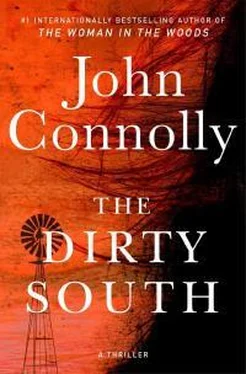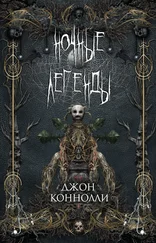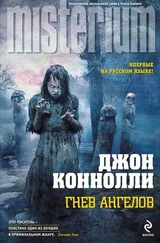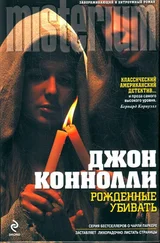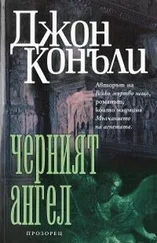‘Sit down, Jurel,’ ordered Pappy. ‘You’re making me nauseous.’
Jurel sat, but his left foot maintained a nervous tapping on the floor.
‘This Donna Lee Kernigan,’ said Pappy, ‘you sure she died like the last one?’
‘A stick at each end,’ said Jurel, ‘like a spit roast.’
‘My God,’ said Pappy, although it wasn’t clear whether he was reacting to the nature of the crime, his son’s analogy, or both. ‘And there’s no question about it being in Cargill’s jurisdiction?’
‘We could argue geography, but Griffin won’t listen. We might lean on him. One of our banks holds the paper on his home. Plus, he wants to keep his job. He loves it, just as I love mine.’
‘Lean on him to what purpose?’
‘To encourage him to hold off on any formal investigation until Kovas has committed to the county. Once we have contracts signed, they can’t pull out, right?’
‘They can pull out anytime they please,’ said Pappy, ‘especially if it emerges that information pertinent to their final decision was concealed from them. I think serial murders might qualify in that regard. We could end up in court until the Second Coming.’
Pappy dropped a peppermint Tic Tac into his mouth. He sucked on them continuously, ever since his cardiologist had ordered him to give up smoking and cut down on his drinking. Pappy kept boxes of Tic Tacs in his office drawers, the glove compartment of his car, and the pockets of his clothing. Like a skeleton, he rattled when he walked.
‘If there’s an investigation, and publicity,’ said Jurel, ‘they won’t have to pull out because they’ll already have opted for Texas.’
Pappy crunched down hard on the Tic Tac.
‘When are you meeting Griffin?’
‘In about an hour.’
‘Tell him to come here.’
‘Are you sure?’
‘If I wasn’t, would I have said it? Evan Griffin’s a reasonable man. He wants what’s best for the county. There might be a way we can make this work for everyone.’
Jurel understood by his father’s tone that this part of the conversation was now concluded. He moved to the french windows to stare out at the garden beyond. It was in a poor state, even for the time of year. His mother had always tended it well, but Pappy took no interest or joy in plants and flowers, and with his wife’s passing it had fallen into disrepair. A yard service came in during summer to keep the lawn trim, and clean up the leaves in the fall, but any suggestion that Pappy might like to add some color to the beds fell on deaf ears. It was possible, Jurel considered, that only his father’s affection for his departed spouse prevented him from paving over the garden entirely.
Not that the house itself was in significantly better condition. Ever since Nealus had moved to his own place – although one, by mutual agreement among the siblings, on their father’s land, and within summoning distance of the family home – the dwelling appeared to have grown darker and dustier, despite the efforts of Miss Quinnett, who took care of cooking and cleaning for Pappy. He wouldn’t allow her to disturb the rooms he used regularly, and claimed the vacuum cleaner gave him a headache. He also preferred dimness to brightness, and eschewed any illumination stronger than lamplight. The whole property bore a miasma of mortality.
And was that such a surprise? For all his apparent haleness, Pappy was catching glimpses of the Reaper. His mind was still alert, but his body was ailing. His enduring legacy would be the Kovas deal, and the consequent transformation of Burdon County’s fortunes. Already he had arranged an endowment for a new library in Cargill to be erected in his name after his death, even though he’d never read a book for pleasure in his life. But he’d also ordained that, should he die while the current governor remained in office, he didn’t want him to turn the first sod, or any other such nonsense, on the grounds that ‘fucking Huckabee will just fill the whole place with Bibles.’ Pappy wanted Jim Guy Tucker to do the needful instead. Jim Guy might have been a crook, but at least he wasn’t always bothering Jesus with his shit.
‘Jurel?’
His father’s voice brought Jurel back.
‘Yes?’
‘You still think a Negro killed those girls?’
Jurel considered the question.
‘I believe it would be for the best if that was the case,’ he said.
Which wasn’t really answering the question.
‘You have any suspects?’
Yes, he had suspects. The county wasn’t short of coloreds with criminal records, some of them violent – wasn’t short of white people with records either, but that was beside the point.
‘Some.’
‘Well, leave me to reflect on how we might progress with that.’
Jurel didn’t make any objection, didn’t attempt to point out that he was the law in the county, not some old man sucking on Tic Tacs because he was too scared to smoke. It wouldn’t have been true anyway. Power and money determined the law, and justice, like beauty, was in the eye of the beholder.
Jurel left Pappy’s office, closing the door behind him. From the kitchen he heard the clattering of Miss Quinnett. She’d been a fixture in the house for as long as he could remember, back when she was in her thirties and he was still a little boy. She’d never married. He’d never thought to ask why, except that he thought she loved his father – not in a sexual way, or as a dog might love its master, but as a mother loves an errant child that has grown into an equally errant adult. Even though she was younger than Pappy by fifteen years, she seemed to Jurel to be much older, as though this house had stolen the years from her.
Miss Quinnett was to be looked after in his father’s will, but with a percentage, not a set sum. She, too, would benefit from Kovas’s arrival in Burdon County, if only so that she might pass on her employer’s largesse to various brothers and sisters, and assorted nieces and nephews. But even in this simple way, so many lives would be improved.
Jurel opened the front door. A man was approaching the house, his build so thin that he seemed almost to pass untouched between the raindrops: Nealus, youngest of the clan. Behind him, a Mercedes was pulling into the drive, a woman behind the wheel: Delphia, arriving. The Cades were closing ranks, securing their future and that of the county.
Jurel wondered if Nealus had been watching for his sister. They had always been intimate, these two, eldest and youngest siblings respectively, and more so since the death of their mother. Jurel, the middle child, had been equally distant from both, like the apex of a long, narrow triangle.
Wreathed in the crepuscular light of home, he waited to admit them.
32
Parker and Griffin stood on an escarpment, the result of some tectonic shift in the landscape many thousands of years earlier, with forest behind and sparser growth below. The slope was a mixture of exposed stone and thin grass; it wouldn’t be too difficult to descend, but less risky when the ground was dry. They’d already been forced to walk from the road to this point, and Parker had accepted the offer of a raincoat from Griffin. It wasn’t doing much to keep his head dry, but a man took his comforts where he could.
Griffin pointed toward a stand of pines below, where the remains of crime scene tape still fluttered.
‘That’s where Patricia Hartley’s remains were discovered,’ he said. ‘We can take a closer look if you like, but there won’t be much to see. We think she rolled down the slope before coming to rest at the foot of those pines. Even Loyd Holt doesn’t contest that; he just elects to believe she was still alive when she started falling. She had abrasions all over, and the branch in her’ – Griffin paused, and settled for ‘lower body’ – ‘had snapped. We found the other half of it about halfway down the slope, right about where that big boulder juts out.’
Читать дальше
